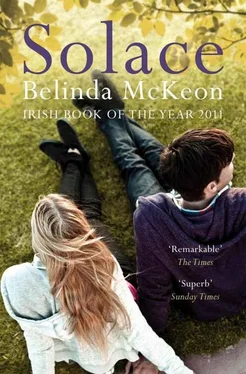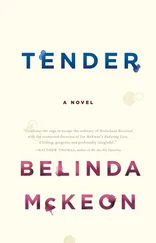‘She’s grand, Mark,’ Maura said, and the two of them looked to her anxiously, imploringly. You, both their stares seemed to say. You know what to do with one of these. You had one. You had two. You know the rules. Show us. Tell us. Make this thing possible for us to do.
But then, just as quickly, they looked away, to the child again, and they were focused tight in on her as though on a button they were trying to unfasten; pulling the white cap back down over her head, taking the little hands and hiding them under white cotton cuffs, touching the tiny, crumpled face and willing it to smooth into contentment. And at that kind of willing, that kind of wishing, they would spend, probably, most of the rest of their days. She would be back in a couple of minutes, Maura told them, and she stepped out into the narrow, nurse-bustling hall.
Maura had worked in a hospital with mothers and babies for nearly half her life. When they had taken children out of women with forceps, or when they had broken women’s pelvic bones, or when they had taken stillborns away in tin buckets, thrown them out with the slops, she had not thought of any of it as inhuman, as horrific. It had merely been the way. Still, when her own time had come, with Nuala and then with Mark, she had gone not to the manor in Edgeworthstown but to the big hospital in Mullingar, where everything was new and the doctors were young and the maternity wards were like something out of a film. But still it had felt like a slaughtering to bring each of them into the world. Still there had been the forceps, and the blade to make room for Nuala’s head to come, and still there would have been a bucket, or something like it, if anything had gone wrong. She had lost one, but that had been before she had gone her full term; for that, she had been alone. That had been a boy, and he had been given his father’s name.
In the hall she tried to call home again. Tom never picked up the house phone anyway, so she did not know why she was hoping for anything different today, but she let it ring, let it ring until the climb and trill of it started to sound shrill, hysterical, unreal. He could be out on the land or in the yard, or he could be away in the jeep or on the tractor, but he could just as well be there, in the sitting room, staring at the phone as it rang itself out. He would fight her to the last on this, she knew. He would stand his ground. But she would stand hers, and though it was always important to give him the appearance of having got what he wanted, the truth of it was that she always won.
He had not reacted well to the news of the pregnancy. Neither of them had. She was not proud of how she had behaved, of what she had said to Mark, of what she had said about Joanne. But she had apologized, and quickly, and that had been the important thing. She had meant none of it. Mark turning up like that one Saturday in November, with the girl she knew only as the Lynch daughter in tow: it had been too much of a shock. Tom had been at the mart in Granard, and all she had been able to think about, at first, was how she had to get Mark and the girl out of the house before Tom returned, so that she could break the news of their involvement to him in her own way, in her own time. But there was more to it, she had known from their faces, almost as soon as they had walked in the door; she had known right inside herself what it was. So when Mark had told her, it was no surprise, not really, not after she had seen the paleness of the girl’s face as she stood by the range and looked at the floor. Maura had imagined this conversation, or some version of it, all through Mark’s teenage years. Once he was in his twenties she had not worried about it in the same way, and now he was heading for thirty, it should not have been a problem at all, not really, but there was the matter of the girl. And so, Mark had told her that the girl was pregnant, and well pregnant, and that they were moving together into her house in Stoneybatter and making it into something of a home. That the girl was a solicitor, or training to be a solicitor, and had worked it out with her employers: they would keep her on, on condition that she worked right up to the birth and went back again very soon afterwards. And Mark had his grant, and the money he was making from teaching, and that, along with Joanne’s pay from the solicitors, should be enough to get them through the first year.
‘And then?’ Maura had said, and through the crack in her voice there escaped the sourest of laughs. ‘And after the first year is done, what the hell do you propose to do?’
Mark looked stricken. The girl would still not meet her eye. ‘We’ll manage,’ he had said. ‘We’re just trying to work out how to get through the first part for now. It’s all. . it’s all very new.’
‘The first part,’ said Maura, shaking her head. ‘Jesus tonight.’
‘Mam,’ Mark said quietly. ‘Please.’
She had looked at him, standing beside the girl at the range. They were both too awkward, too nervous, to sit down, and Maura was not in the humour, now, to try to make them more comfortable. The girl was still early enough along not to need to be petted, anyway, not to need to get off her feet. She was younger than Mark. She looked like Irene: the strong bones at her cheeks, the high forehead, the freckled skin. But she was like her father in the eyes.
Tom would take this badly. How would she get this story under control by the time he returned? And then, she had realized with a sickening lurch, there was no way to get this under control, no way to manage it. No way to turn it into something other than what it was.
‘And what does your mother think of this, Joanne?’ Maura had asked, and she saw how the girl started.
‘She doesn’t know yet,’ the girl had said.
‘She’ll get a right land, I’m sure, like myself,’ Maura said, and she sighed.
‘I know that.’ For a moment, Maura had thought the girl was going to cry — in fact, Maura had thought the girl should cry — but the tears did not come. What had come instead was the sound of Tom’s jeep on the drive.
The hours afterwards were not something Maura liked to remember. Tom had looked at Maura suspiciously as soon as he walked in. Joanne had been introduced, and there had been for Maura the pain of watching confusion spread over his face, of watching fear set in. When Mark had told him about the pregnancy, all he had said was ‘What? What?’ over and over again, and he had looked to Maura, the way he always did when he wanted something fixed or something righted or something arranged; he had looked to her, waiting for her to make it go away. And then he had gone very quiet, and very still, and he had looked first to Mark and then to the girl. ‘You’d better sit down, so,’ he had told her.
When she had sat, she had sat in Tom’s seat, the one beside the range, but that had hardly mattered any more.
The call had come to the house before seven o’clock that morning. Maura had answered it, her heart pounding. It was Mark. A baby girl, he said, just over seven pounds. A little mite, Maura had answered, shocked to find herself in tears.
He didn’t think she had felt like a mite to Joanne, Mark had said in return, and Maura could hear the shock still in his voice. He had been in there with her. Of course: that was how it was done now. Well, he had seen something that he would never forget. Maura was seized with a longing to comfort him but then she was surprised to find herself thinking, instead, of Joanne. She would see them at the hospital in a couple of hours, she said.
She had got there by noon. She had brought a bag filled with the things she knew Joanne would need — not just Babygros and nightgowns, but sanitary pads, and nipple pads, and creams, and a few new pairs of underwear. It had been a short enough labour, seven hours, but one of the nurses had told Maura that it had gone very hard on Joanne. ‘And on Dad too,’ she had added, for a moment confusing Maura, who had thought of Tom, and of how she had gone back up to the bedroom that morning to give him the news, and of how he had just turned away from her in the bed.
Читать дальше












